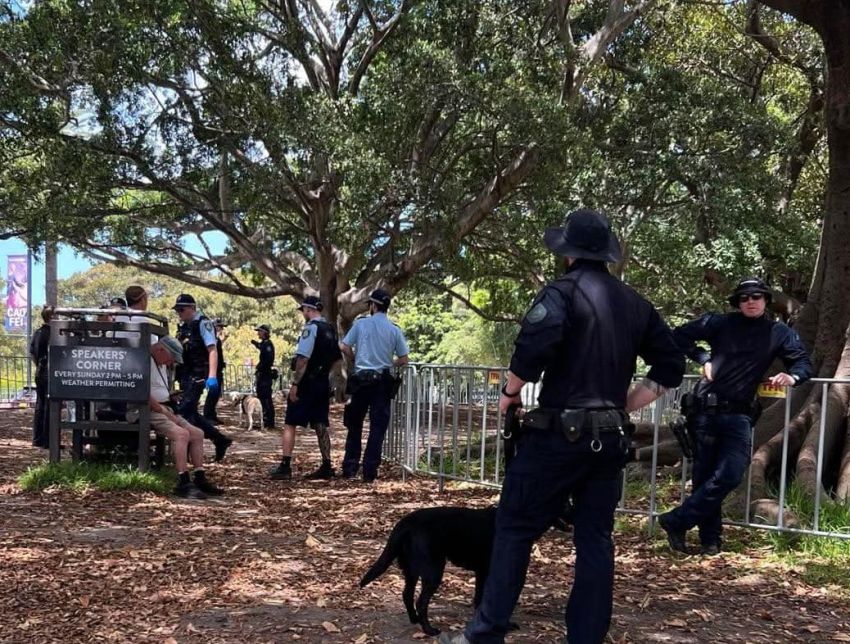
Raya Meredith was 27 when she attended the Splendour in the Grass Festival in July 2018, excited to see her favorite band, a winner in the Triple J Hottest 100 music poll.
As Meredith made her way to the festival entrance, a police dog momentarily sniffed in her direction. Shortly afterwards she was stopped from entering by a male police officer who said words to the effects of “The dog has detected drugs on you. If you follow me, we need to conduct a search.”
She does not recall if he was wearing a badge.
A police officer took Meredith into a makeshift police inspection area with three walled cubicles. She was asked if she had any drugs and she said no.
A female police officer conducted an ordinary search, then directed her to take her shoes and socks off, and then pull down her top. The officer then directed her to lift up her breasts, lean forward and drop them. Meredith complied.
She was asked if she had inserted anything, to which she replied she had not, but had a tampon in. The officer said: “If you’re lying, you will be kicked out of the festival.”
Meredith feared the officer was going to perform a cavity search and felt like vomiting. She was instructed to strip her clothes off, take out her tampon and bend over.
While doing so, without any warning, a male police officer entered the cubicle to tell the woman officer that no drugs were found in Meredith’s bag.
Shaken and distraught, Meredith was allowed to put her clothes back on and leave, but only after police took her driver's licence details.
She told her friends that she had been strip searched and was “in shock”.
According to the judgment, Meredith “accessed a toilet cubicle where she removed and disposed of the tampon that was still sitting uncomfortably inside her, following the search. She recalled struggling to open the packaging of the new tampon because her hands were shaking.”
The dehumanising strip search, which legal advocates describe as sexual assault, took half an hour.
Meredith is the lead plaintiff in a class action over her unlawful strip search by NSW Police.
NSW Supreme Court Justice Dina Yehia ruled that her strip search was unlawful and that there had been “a flagrant disregard for the rights of the plaintiff”, which resulted in “significant harm” to her privacy, liberty and dignity. It ordered her damages of $93,000 on September 30.
Slater and Gordon and Redfern Legal Centre are leading the class action, which now includes 3000 people who were strip searched at music festivals in NSW from July 22, 2016, to July 21, 2022.
Anyone subjected to a strip search by NSW Police at music festivals between these dates can register their interest.
“I am but one of many whose unfortunate experience at the hands of NSW law enforcement will haunt,” Meredith said, adding, “I would like to see justice for all in the class action … I sincerely hope that this case brings an end to the practice of unlawful strip searches.”
Slater and Gordon spokesperson William Zerno said this is the largest class action against police in Australian history. He said Meredith was the only person to give evidence and that “extraordinarily, not a single police officer gave evidence in the trial defending the practice”.
He said mere indications by police drug dogs, or a suspicion of drug possession, are “insufficient to justify a strip search by police”. He said the findings will “likely render thousands of police strip searches of young people at music festivals to be unlawful”. It will likely also impact the lawfulness of strip searches conducted elsewhere.
He said the evidence showed that “NSW Police undertook searches on an industrial level at festivals” with “little or no regard to the legislative safeguards which are intended to check the use of these extraordinary powers”.
Concerns around these searches have been explored in several inquiries by the NSW independent police oversight body, the Law Enforcement Conduct Commission, in NSW Parliament, Redfern Legal Centre and the New South Wales Council for Civil Liberties.
Redfern Legal Centre spokesperson Samantha Lee commended the “courage of young people” for taking this class action. “When no government stood up for them, they stood up for themselves,” she said. “The case sends a clear message to NSW Police — hands off young people and children’s bodies.”
Lee said the decision “provides a path to monetary compensation and a sense of justice to thousands of young people, children and adults who were unlawfully strip-searched”.